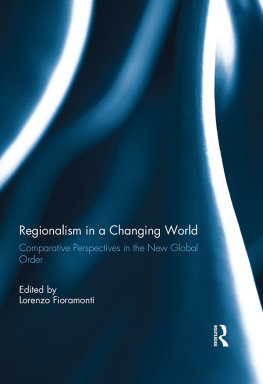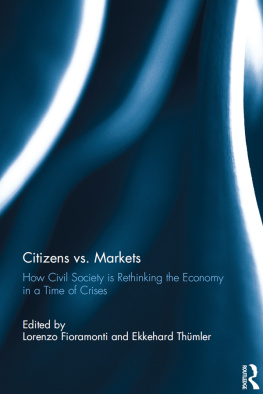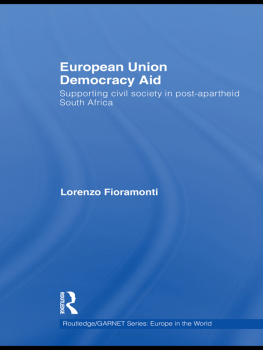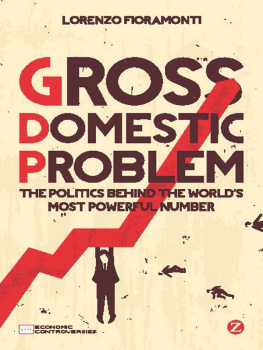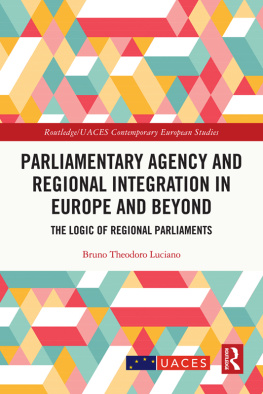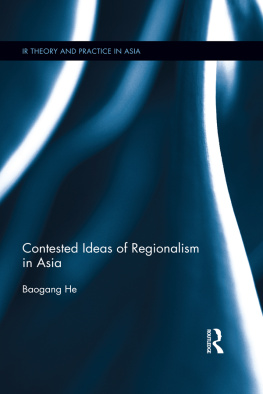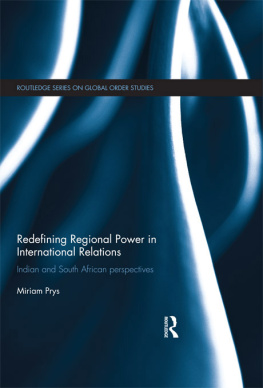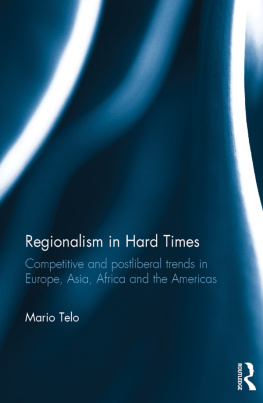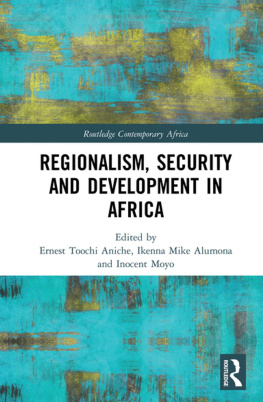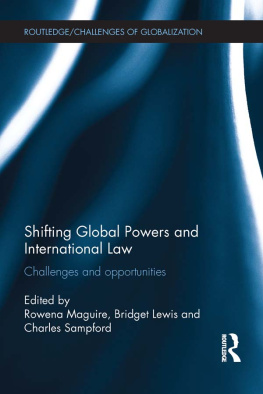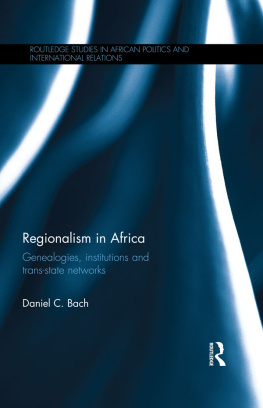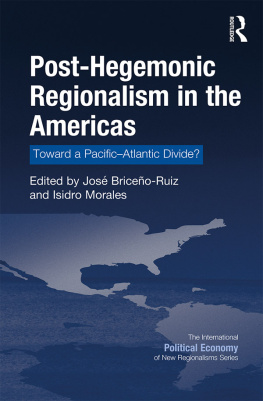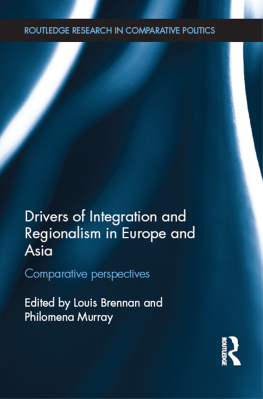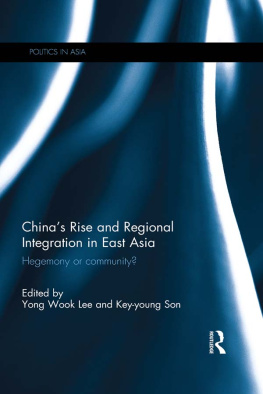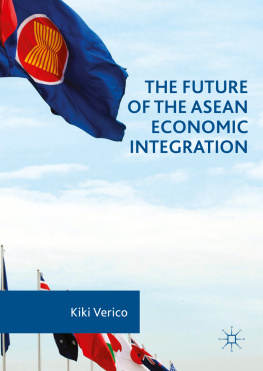Regionalism in a Changing World
Regionalism has been a key feature of contemporary international relations. As the most successful case of regional integration, the European Union (EU) has been leading the international debate. Yet, in the past few years new regional practices have emerged in other continents, thus adding to the variety and scope of regionalization processes. This book provides a comprehensive overview of the state of regionalism in a global arena ever more dominated by emerging powers and shifting political/economic balances. Against the backdrop of the global economic crisis, which has invariably weakened Europe and its integration model, the book examines the pace of integration in Africa, Asia and South America, highlighting the opportunities and challenges that the new global order poses to contemporary regionalisms. Besides a number of empirical case studies focusing on the political, economic and legal aspects of regio-nalization, the book also discusses innovative theoretical approaches to the study of regionalism in a post-European context.
This book was originally published as a special issue of The International Spectator.
Lorenzo Fioramonti, PhD, is Associate Professor of Political Science at the University of Pretoria (South Africa). His recent publications include Regions and Crises (Palgrave 2012), European Union Democracy Aid (Routledge 2010) and External Perceptions of the European Union as a Global Actor (Routledge 2010).
Regionalism in a Changing World
Comparative Perspectives in the New Global Order
Edited by
Lorenzo Fioramonti
First published 2013
by Routledge
2 Park Square, Milton Park, Abingdon, Oxon, OX14 4RN
Simultaneously published in the USA and Canada
by Routledge
711 Third Avenue, New York, NY 10017
Routledge is an imprint of the Taylor & Francis Group, an informa business
2013 Instituto Affari Internazionali
This book is a reproduction of The International Spectator, vol. 47, issue 1. The Publisher requests to those authors who may be citing this book to state, also, the bibliographical details of the special issue on which the book was based.
All rights reserved. No part of this book may be reprinted or reproduced or utilised in any form or by any electronic, mechanical, or other means, now known or hereafter invented, including photocopying and recording, or in any information storage or retrieval system, without permission in writing from the publishers.
Trademark notice: Product or corporate names may be trademarks or registered trademarks, and are used only for identification and explanation without intent to infringe.
British Library Cataloguing in Publication Data
A catalogue record for this book is available from the British Library
ISBN13: 978-0-415-80996-2
Typeset in Times New Roman
by Taylor & Francis Books
Publishers Note
The publisher would like to make readers aware that the chapters in this book may be referred to as articles as they are identical to the articles published in the special issue. The publisher accepts responsibility for any inconsistencies that may have arisen in the course of preparing this volume for print.
The chapters in this book were originally published in the The International Spectator, volume 47, issue 1 (February 2012). When citing this material, please use the original page numbering for each article, as follows:
Comparative Regionalism: A Field Whose Time has Come?
Amitav Acharya
The International Spectator, volume 47, issue 1 (February 2012) pp. 3-15
Why We Need to Unpack Regions to Compare Them More Effectively
Luk Van Langenhove
The International Spectator, volume 47, issue 1 (February 2012) pp. 16-29
Sovereign Debt Crisis in Euroland: Root Causes and Implications for European Integration
Henk Overbeek
The International Spectator, volume 47, issue 1 (February 2012) pp. 30-48
New Legal Instruments in a Changing World: Legal, Political and Cultural Developments in EU Judicial Cooperation
Daniela Piana
The International Spectator, volume 47, issue 1 (February 2012) pp. 49-66
Breaking Free from Europe: Why Africa Needs Another Model of Regional Integration
Peter Draper
The International Spectator, volume 47, issue 1 (February 2012) pp. 67-82
Legal Harmonisation in Africa: Taking Stock and Moving Forward
Magnus Killander
The International Spectator, volume 47, issue 1 (February 2012) pp. 83-96
Regionalism in Asia as Disguised Multilateralism: A Critical Analysis of the East Asia Summit and the Trans-Pacific Partnership
David Camroux
The International Spectator, volume 47, issue 1 (February 2012) pp. 97-115
Has Regionalism Peaked? The Latin American Quagmire and its Lessons
Andres Malamud and Gian Luca Gardini
The International Spectator, volume 47, issue 1 (February 2012) pp. 116-133
A Changing Mediterranean: Regional Organisations and North Africa during the Arab Spring
Marco Pinfari
The International Spectator, volume 47, issue 1 (February 2012) pp. 134-150
Conclusion - Building Regions from Below: Has the Time Come for Regionalism 2.0?
Lorenzo Fioramonti
The International Spectator, volume 47, issue 1 (February 2012) pp. 151-160
Supranational regions have become important players in global affairs. They coordinate trade flows, often regulate the inflow and outflow of capital, people and goods, hold international summits and directly (or indirectly) participate in the key forums of global governance. While the European Union (EU) has traditionally been the only significant regional actor in international politics, in the past few years old and new regional groupings have developed capacities, instruments and policies allowing them to have a voice in the running of global affairs. From the African Union (AU), to the various evolutions of the Association of South East Asian Nations (ASEAN) and the Latin American Southern Common Market (Mercosur), not to mention new entries such as the Trans Pacific Partnership (TPP) and the Union of South American Nations (UNASUR), the kaleidoscope of regional politics has become increasingly diverse.
This special issue of The International Spectator draws on an international conference that took place at the University of Pretoria (South Africa) in February 2011, thanks to generous funding from the European Union (through its Jean Monnet Research and Information Activities, Agreement no. 175987-LLP-1-2010-1-ZA-Am-IC) and the South African Department of Science and Technology. It provides a state-of-the-art analysis of the past and present developments in regionalism across the world and attempts to identify potential trends for the future. It is divided into four sections. The first articles discuss the theoretical implications of the increasing diversity within the world of regions with a view to expanding the boundaries of comparative analysis in the scholarly field of regional studies. The central sections are devoted, in order, to Europe, Africa, Asia and Latin America. The contributions on Europe discuss how the increasing complexity of international governance, especially in the field of finance, security and justice, has forced the EU to reinvent itself. While the current financial crisis (particularly its implications on sovereign debt) appears to be bringing Europe to its knees and forcing austerity reforms throughout the Union, the fight against organised crime and terrorism has allowed European countries to reach a deeper level of cooperation in the judicial field, with an important impact on the creation of a common judicial culture. The articles on Africa reflect on the need for this continent to find its own way to integration, breaking free from the European model and carving out a space for innovative thinking, not only in the field of institution building, but also in economic and judicial cooperation in a region still marred by underdevelopment and conflict. Finally, the contributions on Asia and Latin America provide a thorough account of recent developments in these regions and identify the potential gap between the ambitious rhetoric and the actual achievements of two fundamental areas of the world, ever more dominated by emerging powers such as China, India and Brazil.

